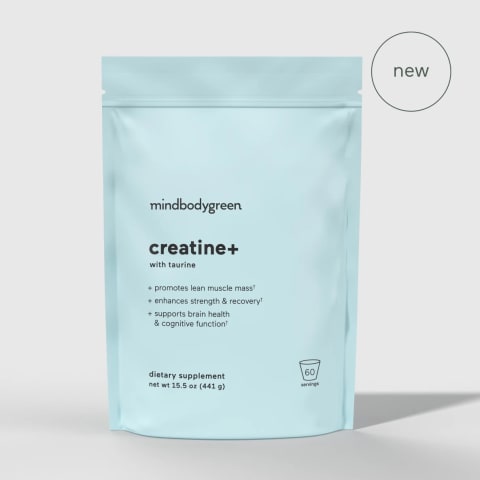Are Creatine Supplements Bad For Your Kidneys? What’s Fact vs. Fiction
Here's what you should know.

Advertisement
This ad is displayed using third party content and we do not control its accessibility features.

Registered Dietitian Nutritionist
Registered Dietitian Nutritionist
Molly Knudsen, M.S., RDN is a Registered Dietician Nutritionist with a bachelor’s degree in nutrition from Texas Christian University and a master’s in nutrition interventions, communication, and behavior change from Tufts University. She lives in Newport Beach, California, and enjoys connecting people to the food they eat and how it influences health and wellbeing.
Image by BONNINSTUDIO / Stocksy June 19, 2024 We carefully vet all products and services featured on mindbodygreen using our Our selections are never influenced by the commissions earned from our links. Creatine supplements are getting a lot of attention these days. Influencers are sharing how these powders helped transform their body composition, recovery, and strength. And new research is being published on the compound's cognitive capabilities (like this recent study showing its energizing effects after sleeping poorly). But there’s also some information circulating that creatine is bad for kidney health. This noise is so loud that people are hesitant about the supplement’s safety profile, which is fair. You should always confirm the safety and effectiveness of a supplement before giving it a go. So we’re here to set the record straight when it comes to creatine. 
Creatine has an exceptionally strong safety profile
Decades of research demonstrate that creatine supplements are safe and have minimal side effects1 in healthy individuals. The notion that it could negatively impact kidney health (for people without pre-existing kidney problems) is a common misconception.
How did this misinformation spread? Well, as creatine supplements can help improve physical performance2 (like enhancing muscle mass and strength), people have wrongly perceived this compound to be a steroid—which it is very much not.*
Anabolic steroids are classified as drugs, are regulated substances, and can aggravate the kidneys3.
Creatine, on the other hand, is a compound that is simply derived from the amino acids glycine, arginine, and methionine. It’s a completely different chemical structure and impacts performance in a completely different way (by supporting the body’s ATP energy production4).*
Research shows that supplementation does not result in kidney dysfunction when taken at recommended doses in healthy individuals.
However, one case report5 published in 1998 severely tarnished the compound’s reputation and continues to be a source of misinformation to this day.
In this report, author’s cited creatine supplements as a contributing factor to a young man’s renal dysfunction.
While this paper was published in a well-respected scientific journal (Lancet), the authors inaccurately represented creatine’s role—so much so that two other teams of creatine researchers wrote letters to the editor. However, the information had already circulated and people had something to reinforce their apprehension.
Since then, researchers have conducted numerous experimental, controlled research trials to investigate the effects of creatine and kidney health, and the results are consistent.
In a 2021 review article, researchers declared6, “After nearly 30 years of post-marketing surveillance, thousands of exposures, and multiple clinical trials, no such evidence [of kidney problems with creatine] exists.”
Creatine vs. creatinine
The sticky relationship between creatine and kidney health has persisted all these years thanks to creatinine4. Clinically high creatinine levels are used as an indicator that something may be off with the kidneys—but it is not a direct measure of kidney function.
For some people, “Taking a creatine supplement may increase blood levels of creatinine (a waste product from the digestion of protein),” says Michelle Darian, M.S., MPH, R.D.
As creatinine is a waste product of protein digestion and muscle metabolism, creatine supplements as well as high-protein diets7, and high levels of lean body mass8 can all increase creatinine levels, which doesn’t reflect poor kidney function.
This is important to know as blood testing outside of a doctor’s office is becoming increasingly common, and interpreting lab results (like creatinine) is quite common.
Creatine vs. creatine kinase
Another blood biomarker people think creatine increases—and therefore negatively impacts—is one called creatine kinase9.
As a dietitian at the personalized health platform InsideTracker (which includes blood testing), Darian gets asked this question all the time by customers.
“Creatine kinase is a measure of muscle breakdown—with higher levels indicating more muscle breakdown,” notes Darian. “People that see a really elevated creatine kinase level often jump to the conclusion that their creatine supplement is the culprit, but that’s not the case.”
Don’t let misinformation keep you from reaping creatine’s benefits
Creatine supplements are truly one of the most studied supplements on the market—for safety and for physical and cognitive benefits like:*
And most research shows taking a modest 5-gram dose (typically just one small scoop of powder) is ideal—in addition to regular exercise of course.
mindbodygreen’s creatine+ pairs an ideal 5-gram creatine dose with 2 grams of the amino acid taurine to further support muscle and brain health.* And people are loving this unique combination.
The takeaway
Misinformation about creatine and kidney function has been rampant for years. But all the research to date does not show side effects at the recommended doses of creatine supplementation on kidney health for healthy people6.
If you do have individual health considerations (including kidney concerns), it’s always best to talk with your healthcare provider before starting a new supplement.
If you are pregnant, breastfeeding, or taking medications, consult with your doctor before starting a supplement routine. It is always optimal to consult with a health care provider when considering what supplements are right for you.

 Tekef
Tekef 






























